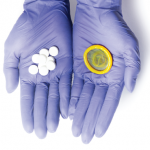- Encourage ART for patients with stable or quiescent disease;
- Consider prophylactic anti-coagulation for aPL-positive or obstetric antiphospholipid syndrome (APS) patients;
- Use therapeutic anticoagulation for thrombotic APS patients;
- Continue immunosuppressants, other than cyclophosphamide, for oocyte retrieval for cryopreservation or surrogacy; and
- Do not automatically use prophylactic prednisone in SLE patients; treat with prednisone if a flare develops.
Good practice statement: Men on intravenous cyclophosphamide who wish to preserve fertility should cryopreserve their sperm, ideally before initiating cyclophosphamide, but testosterone co-therapy is not recommended.
Recommendations include: Consider co-therapy with a gonadotropin-releasing hormone analog (such as leuprolide acetate) for women on intravenous cyclophosphamide. Challenges include a need to administer this drug 10 to 14 days before starting cyclophosphamide and insurance coverage.
Menopause
Guidelines on menopause include a good practice statement: Rheumatologists should treat women with rheumatic diseases other than SLE or those with positive aPL with hormone-replacement therapy (HRT) according to the guidelines for the general postmenopausal population.2 Use the lowest dose to alleviate symptoms for the minimum time necessary immediately following menopause onset.
‘Our patients really do want to talk to their rheumatologists about these topics.’ —Dr. Sammaritano
“Long-term HRT therapy, we now understand, has significant risks, including stroke and breast cancer,” and should be reserved for patients with severe symptoms that don’t respond to non-hormonal therapies, Dr. Sammaritano said.
Recommendations include:
- Consider HRT in women with SLE (one study found a small increase in mild to moderate flares);3 and
- Avoid HRT in aPL-positive women.
Consider transdermal over oral HRT to reduce venous thromboembolism risk, the panel suggested.
Pregnancy Assessment & Management
“The impression that we got from our Patient Panel is that they want to discuss family planning issues early and often” with their rheumatologists, said Dr. Sammaritano.
Good practice statements include counseling patients on how quiescent or low disease activity prior to pregnancy results in good outcomes, and that in pregnant women with SLE, rheumatologists should monitor their disease activity at least once per trimester.
Recommendations include:
- In patients taking medications not compatible with pregnancy, switch to a pregnancy-compatible medication, observe for a time, and assess for tolerability and efficacy of the new drug before attempting pregnancy;
- Start a pregnancy-compatible medication if active disease develops during pregnancy; and
- Check anti-Ro/SSA and anti-La/SSB antibodies before or early in pregnancy.
In women with SLE:
- Check aPL antibodies (including anti-cardiolipin, anti-beta2-glycoprotein I and lupus anticoagulant) before or early in pregnancy;
- Continue hydroxychloroquine; and
- Consider low-dose aspirin to prevent preeclampsia, and start this in the first trimester.
In women with systemic sclerosis:


